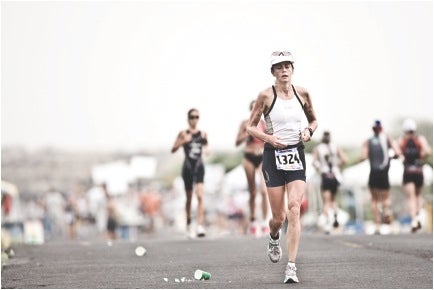How Do I Ease GI Distress During A Race?

Photo: John Segesta
Almost every athlete suffers from GI issues at some point during racing or training—even the pros. But not all come in the same guise or are predictable. And as with all nutritional issues, the solution can be highly individual.
Trial and error can help you identify and therefore prevent GI issues. For Jordan Rapp, a three-time Ironman champion who has been open about the GI issues that led to his first-ever Ironman DNF, experimenting led to him shunning gluten and upping his salt intake. “I take about 1.5 to twice as much sodium per hour as what’s in the ‘high electrolyte’ drinks (usually about 1.5g/hour), and that’s helped with stomach issues a lot,” he says. Ben Hoffman, another three-time Ironman champion, agrees. “Focusing on electrolyte balance and proper intake of fluids to dilute sugars is the key to keeping my stomach under control,” Hoffman says. “I tend to need a fair bit of salt, and operate best on fluid nutrition that is about 6–8 percent carbohydrate solution.”
In fact, getting sodium levels right is as important for reducing GI issues as getting the right balance of fluids and calories.
During a disastrous IM Arizona in 2008, two-time Ironman champion Joanna Zeiger withdrew 10 miles into the run due to vomiting, diarrhea and a stomach so severely bloated family members on the sidelines were concerned. It turned out she was not tolerating fructose—an ingredient ubiquitous in sports products—and has since adapted her nutrition.
RELATED: Dealing With Irritable Bowel Syndrome
When you sense impending GI doom during a race, try this:
» Slow down. Yes it’s a race, but sometimes slowing down can actually save time in the long run: “One of the best pieces of advice that I’ve received is that it generally takes less time to settle an angry stomach than you’ll lose if you try to race through it,” Rapp says. Slowing down will lower your heart rate and allow more blood to get to your stomach for better digestion.
» Tune In. Drink some plain water once GI troubles strike, advises Hoffman. “It can dilute the sugar concentrated in the stomach, and ease the acidic feeling some.” Rapp goes the opposite route and drinks Coke when things go awry, highlighting just how individual nutrition requirements are and the importance of experimentation in training. Both dehydration and overhydration are major causes of GI trouble, so try to listen to your body to determine if you need more/less fluids or perhaps more/less sodium.
» Stop eating. This is a pretty general recommendation from all the pros. Even with a stomach of steel and a fueling equation that she sticks to like glue, multiple 70.3 champion Kelly Williamson dials back on the calories and fluids when she starts to feel too full. Eating more when your GI system is struggling will only exacerbate the problem.
RELATED: Race With A Happy Tummy